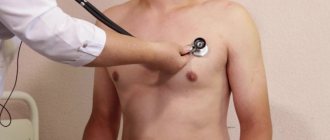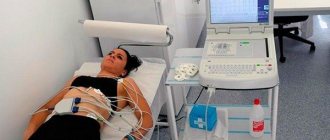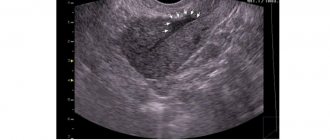Can scratching your fingers lead to heart defects? What are the causes of heart defects and how to prevent this pathology? How do acute respiratory viral infections and acute respiratory infections affect the heart? Can a nasopharyngeal infection lead to a stroke? Elena Nikolaeva, a doctor at the Medservice clinic, answers current questions related to the detection and treatment of heart defects.
There are two types of heart defects - congenital and acquired. The first are anomalies of the cardiac structures and circulatory system that arose during the formation of cardiac structures in utero. They are usually detected at the perinatal stage. This is the topic of a separate article, but here we note that according to statistics, for every hundred newborns there is one baby with a congenital heart defect.
Acquired heart defects are most often the result of complications caused by viral (bacterial) infections, heart injuries, and atherosclerotic damage to the valve apparatus. That is, those banal ARVIs that we are used to treating ourselves, based on the Internet, family recipes and “one grandmother told us,” end in complications in 15% of cases. Namely, inflammatory damage to the walls of the heart and its valve apparatus. In some cases (in the absence or improper treatment of a viral infection), this may lead to the need to replace the affected valve with an artificial prosthesis or even a heart transplant.
No magical and miraculous folk remedies, not a single pill, not to mention dietary supplements, could “darn” the damaged muscle or restore the valve destroyed by the virus.
How does heart disease develop?
As a rule, acquired heart defects are associated with infectious diseases. In childhood it is rheumatism. This is what people call back pain, which is completely wrong. It is actually a viral disease caused by group A β-hemolytic streptococcus. It is common in our environment but causes heart and joint damage in those who are genetically predisposed to it. It is important to identify this in childhood and adolescence. To do this, a genetic analysis is carried out and, if detected, a prophylactic dose of bicillin is prescribed for life. Identifying a person’s rheumatic predisposition is a priority for pediatricians and pediatric cardiologists. If they missed something, then in adulthood we are dealing with a ready-made heart defect.
It is important!
Any nasopharyngeal infections, sore throat, ARVI, acute respiratory infections, influenza can affect the heart. Especially if a person violates the regime, that is, suffers from a “sickness on his legs”, continues to go to work and is treated incorrectly. Then the virus spreads throughout the body, affecting various organs, including the heart.
The next group of causes of acquired heart defects are chest injuries received from a fall from a height or from blows to the chest (sports competitions, knife wounds, etc.). In this case, the subvalvular structures are more often damaged (torn off), namely the threads (chords) that hold the valves in a tense state. The result is valve failure. By the way, the separation of chords caused by the formation of atherosclerotic plaques on them can lead to the same consequences.
Prevention
A proven method of preventing secondary diseases of the cardiovascular system is vaccination. Vaccines against influenza viruses, meningococcal infections, hepatitis and other pathogens are available in medical institutions. Maintaining good hygiene, frequent hand washing and using disinfectants will help prevent infection in public places.
When the first signs of a cold appear, it is recommended to remain in bed.
If there is no improvement in the patient’s condition within a week, or if he is bothered by pain in the heart after the flu, immediately consult a doctor.
How to properly treat viral diseases of the nasopharyngeal system
To ensure that a viral disease does not affect vital organs, treatment must be prescribed and supervised by a doctor. In no case should this be self-medication or based on the advice of pharmacists, as is often the case. It's no secret that treatment is often prescribed directly in pharmacies.
However, there are general recommendations. The first is maintaining bed rest, which reduces the spread of the virus throughout the body. Secondly, it is in the first three days that a course of antiviral therapy must be carried out. If you didn't do this, then you are late. On the fourth or fifth day, the virus is no longer in the blood. With paracetamol, aspirin and other antipyretics, we remove the symptoms, but not the pathogen itself. And if the temperature remains high for more than four days, then most likely a bacterial infection has joined the virus. And then the question of prescribing an antibiotic may arise.
This is the most general scheme. Only a doctor can determine medications, the regimen for taking them, and the regimen.
The consequences of improper treatment or lack thereof can be very dire. For example, a pathological heart condition popularly known as “bull’s heart” is associated with beer abuse. But it can also be the result of neglected or undiagnosed myocarditis, that is, inflammation of the heart after a viral infection. The heart increases (“spreads”) in size, while losing its pumping function. And as a result, heart failure develops: shortness of breath, swelling of the legs, accumulation of fluid in the abdomen. And then only a heart transplant. There are no other radical methods of combating the “bull’s heart”.
Why is my heart so worried: are heart complications possible with the flu?
Author Alexander Prikhodko
09.12.2015 13:28 (Updated: 03.06.2021 17:18)
Health » Health and prevention
Among the many complications that are caused by improper treatment of ARVI and influenza, problems with the heart and blood vessels are among the most dangerous and common. We are used to getting sick on our feet and suffering from viral infections in the normal course of work, but we are sincerely surprised when we experience unpleasant consequences.
Heart
Oksana Drapkina , professor, doctor of medical sciences, and acting spoke about which categories of the population are especially susceptible to cardiovascular complications, how to properly treat the virus and how to prevent the risk of complications O. Director of the Federal State Budgetary Institution "GNITSPM" of the Ministry of Health of Russia and Vladimir Zarubaev , Candidate of Biological Sciences, Head of the Laboratory of the Molecular Basis of Chemotherapy of Viral Infections of the Research Institute of Influenza of the Ministry of Health of Russia.
— I’d like to start with a question that seems quite simple at first glance. Why the heart? Why does the heart muscle begin to fail?
O. Drapkina: — There are different reasons. During influenza or ARVI, body temperature rises, and with it the heart rate and, accordingly, the load on the heart increases. And if a person affected by the virus already has cardiovascular diseases, for example, coronary disease or chronic heart failure, an increase in temperature can have a detrimental effect on the functioning of the heart.
Further, this is the direct impact of the virus, which destroys the cells of the body. Reactions to the destructive effects of a virus are always unpredictable, especially if the fight against the virus is either carried out incorrectly or not carried out at all. Under such conditions, myocarditis most often develops - this is inflammation of the heart muscle, myocardium.
— The question immediately arises: are there any ways to reduce the risk of complications during illness?
V. Zarubaev: — First, you need to understand exactly how the virus works. It enters the body, actively divides and destroys cells. However, it is not the virus itself, but the immune response to it that provides additional stress on the body and, accordingly, increases the risk of complications. Also, a lot depends on what virus the patient has. If he knows for sure that he has the flu, which is the most severe type of ARVI, it is better to take special narrow-profile drugs.
Well, if the patient has a simple ARVI or other viruses, then you need to use universal broad-spectrum antiviral drugs - they help a lot. True, when choosing antiviral drugs, you need to pay close attention to their evidence base, which is very important.
If we take the most effective antiviral drugs, the active substance umifenovir, which is part of Arbidol, has received approval from the World Health Organization (WHO). The study conducted on it was the first in our country, which was carried out in accordance with international standards and norms.
Medicines. Thermometer
With another active ingredient - oseltamivir (Tamiflu) - the situation is slightly different: the drugs that contain it are currently considered effective only in the fight against influenza, but are also officially recommended for use by WHO.
In general, the way to exclude cardiovascular complications is simple: when you are sick, you need to be sick. Maintain bed rest, avoid cold temperatures, worries and worries - all this will allow the body to recover as quickly as possible. Most importantly, you should not be on your feet during illness:
- I have to lie down
- to be treated,
- bring down the high temperature,
- take action promptly.
All this significantly reduces the risk of cardiovascular complications.
It is also worth giving up alcohol and smoking, because these bad habits seriously reduce the immune response. And, of course, you should be vigilant and not let the disease take its course. A runny nose, pain in the eyes, and a headache are not just a little fatigue in the body, but the first signs, and by promptly responding to them you can avoid complications.
— Who is at risk for cardiovascular complications?
O. Drapkina: — These are both very young children and elderly patients, pregnant women, that is, those who have weak immunity. Also at risk are those whose bodies do not fight infection well, such as people with chronic non-communicable diseases. Kidney failure, heart failure, liver pathologies, liver cirrhosis - all these diseases increase the risk of worsening the course of ARVI and influenza.
Liver
And, of course, factors such as high blood pressure, temperature changes, and weather changes can trigger the development of hidden complications of the cardiovascular system.
— How can an ordinary person determine that there is a complication in the heart? How does it proceed?
O. Drapkina: — It occurs in different ways: from lightning-fast changes with very serious consequences, even death, to a chronic process, which can manifest itself as heart rhythm disturbances, low fever, and finally, again, heart failure. If, after ARVI and influenza have ended, temperature fluctuations continue and lead to weakness, this is an alarm bell.
Also, there is no need to delay with the ECG if there is a feeling of interruptions in the work of the heart muscle, its freezing and “tumbling,” figuratively speaking. When such symptoms are present, this is a reason to immediately consult a doctor.
Flu is an unpredictable threat
Editor: Olga Alekseeva, Curator: Elena Andreeva
Topics oksana drapkina vladimir zarubaev
Under what “masks” can inflammatory damage to the heart be hidden? Cases from practice
The clinic for heart defects is very individual. The patient was hospitalized with a diagnosis of pneumonia. The high temperature lasts for three weeks, there are obvious signs of heart failure - shortness of breath, general weakness, swelling of the legs, tachycardia. The attending physician suspected endocarditis - inflammation of the inner lining of the heart. We carry out ultrasound diagnostics, or more precisely, echocardiography. We identify a tricuspid heart valve completely destroyed by the virus. Pneumonia in this case developed as a result of so-called “remnants” of the destroyed valve entering the lungs (through the bloodstream).
Ultrasound diagnostics showed that the aortic valve was destroyed. Its, so to speak, “remnants” traveled through the bloodstream to the brain, which led to impaired cerebral circulation.
In some cases, endocarditis may be disguised as a stroke. A young man with a high fever and signs of a stroke was admitted to the intensive care unit of an infectious diseases hospital. Ultrasound diagnostics showed that the aortic valve was destroyed. Its, so to speak, “remnants” traveled through the bloodstream to the brain, which led to impaired cerebral circulation. I'm starting to figure out the source of the infection. Then I pay attention to the small abrasions on my fingers. It turns out that the young man works as a car mechanic without using personal protective equipment. These skin lesions were most likely the entry point for infection.
A subsequent operation to replace the damaged valve with an artificial prosthesis allowed the patient to return to normal life.
References
- Bogomolov, B.P. Infectious diseases: Textbook. - M.: Moscow State University Publishing House, 2009. - 583 p.
- Infectious diseases: national guidelines / ed. N.D. Yushchuka, Yu.Ya. Vengerova. - M.: GEOTAR-Media, 2009. - 1056 p.
- Clinical recommendations “Acute respiratory viral infections in adults” / ed. I.V. Shestakova. - M.: National Scientific Society of Infectious Diseases, 2014. - 53 p.
- Li, S., Lin, P. J., Carney, J. et al. IgM, IgG, and IgA Antibody Responses to Influenza A(H1N1)pdm09 Hemagglutinin in Infected Persons during the First Wave of the 2009 Pandemic in the United States / Clin Vaccine Immunol., 2014. - Vol. 21(8). — P. 1054–1060.
Diagnosis of carditis
Diagnosis of carditis, especially mild forms, is a non-trivial task. Traditional ultrasound diagnostics, especially with mild myocarditis, may not show anything at all. In this case, another (more sensitive) ultrasound diagnostic method will come to the rescue - LVAF; automatic analysis of left ventricular function (AFFL), which will indicate problems in the heart earlier than traditional ECHO-CG.
In addition to heart inflammation, it can detect myocardial ischemia, which leads to heart attack, metabolic disorders, and intoxication. Currently, in Izhevsk it can only be performed at our Medservice clinic. Along with functional diagnostic methods (ECG, ECHO-CG, daily ECG monitoring), laboratory diagnostics are required, including a complete blood count, determination of the level of proteins of the acute phase of inflammation (C-reactive protein, fibrinogen, alpha and gamma globulins) of specific cardiac enzymes ( troponin. CPK-MB, LDH ALT, AST).
In my practice, there was a case when a patient came with only one complaint - rapid heartbeat during a short jog. During the collection of anamnesis, it turned out that her husband had suffered from a cold 10-15 days before, and she had minimal symptoms in the form of nasal congestion. Echocardiography and LVAF did not reveal any changes. But laboratory diagnostics revealed an increase in the cardiac-specific enzyme, CPK-MB. The patient was diagnosed with “myocarditis...” and appropriate therapy was prescribed.
Therefore, if you suspect an inflammatory lesion of the heart, you cannot limit yourself to just one type of diagnosis. It must be comprehensive. Carditis is treated with medication, and the resulting heart defect can lead to death. A timely operation can restore one hundred percent quality of life. But, firstly, it must really be done on time. And, secondly, not everyone is ready for this psychologically. Therefore, there is only one piece of advice: do not trigger viral diseases, but if the above signals occur, check your heart by conducting a comprehensive diagnosis together with a competent and experienced cardiologist.
What to do
10 simple rules will help prevent complications of ARVI at any age:
- Seek medical help on the first day signs of respiratory tract infection and malaise appear.
- Under 18 years of age, if you have a cold, call a pediatrician or family doctor.
- After 18 years of age, they are referred to a general practitioner or infectious disease specialist.
- The disease cannot be treated on its own, much less take antibiotics.
- Minimize the risk of complications only by following the instructions and recommendations of the medical staff.
- If after a cold there is discomfort and pain in the heart, the patient immediately contacts the attending physician and undergoes the necessary examinations.
- To diagnose myocarditis and rheumatic carditis, they donate blood and urine for clinical, biochemical tests and markers of inflammation, take X-rays of the lungs, ultrasound and ECHO-CG of the heart, and an electrocardiogram.
- If signs of heart damage are detected, they donate blood for specific markers of myocarditis - antimyocardial antibodies, perform PCR diagnostics of the infectious agent, and do a bacterial culture of the blood.
- The list of tests for the examination is adjusted by the attending cardiologist or therapist.
- Based on these tests, the doctor prescribes specific therapy in a cardiology hospital.
Treatment rules and patient regimen
Complications of the acute form of ARVI - myocarditis and rheumatic carditis - are treated in a hospital under observation. Patients are prescribed bed rest for the duration of hospitalization. Therapy is carried out in three directions:
- Elimination of the cause of the disease, etiological factor, causative agent of infection. To do this, the doctor prescribes antiviral and antibacterial drugs, taking into account the sensitivity of the flora.
- Fighting the manifestations of the disease - hyperthermia, intoxication syndrome. Anti-inflammatory drugs, antihistamines, and immunosuppressants for autoimmune carditis are added to the treatment regimen.
- Supportive metabolic treatment aimed at strengthening the body's defenses. Such medications include vitamins, complexes with potassium, magnesium, preparations based on meldonium, inosine.









